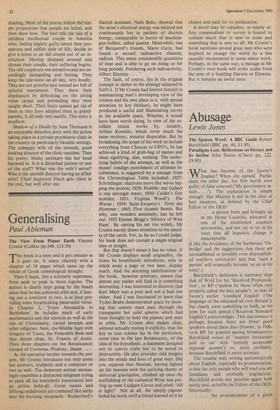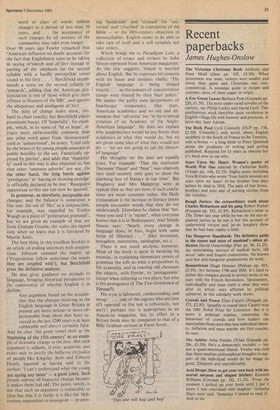Abusage
Lewis Jones
The Spoken Word: A BBC Guide Robert Burchfield (BBC pp. 40, £1.95) Paradigms Lost: Reflections on literacy and its decline John Simon (Chatto pp. 222, £9.95) What has become of the Queen's English? When she opened Parliament the other day, her first words were guilty of false concord (`My government attach . . . '). The explanation is simple enough: Her Majesty is not in the class of best speakers, as defined by the Chief Editor of the OED: . . . a person born and brought up in the Home Counties, educated at one of the established southern universities, and not yet so set in his ways that all linguistic change is unacceptable.
(I like the avoidance of the barbarous 'Oxbridge' and the suggestions that there are unestablished or possibly even disestablished southern universities and that `such a person' will eventually become 'so set in his ways'.) Burchfield's definition is narrower than that of Wyld for his 'Received Pronunciation', or RP ('spoken by those often very properly called the best people'), or that of Sweet's earlier 'standard English' ('the language of the educated all over Britain'), but clearly owes something to both; as his term for such speech (`Received Standard English') acknowledges. This narrowness is perhaps because there are fewer good speakers about these days (Fowler, in 1926, took RP for granted among broadcasters; Burchfield writes of 'weather forecasters and so on' with 'entirely acceptable regional accents') or, more probably, because Burchfield is more accurate.
The trouble with writing authoritatively about English, especially its pronunciation, is that the only people who will read you are fastidious and probably pugnacious. Burchfield avoids any possible aggro both neatly and, as befits the Editor of the OED, historically: . . . the pronunciation of a given word or class of words seldom changes in a period of less than 50 years, and . . . the acceptance of such changes by all sections of the community may take even longer.
Over 50 years ago Fowler remarked that 'American influence no doubt accounts for the fact that Englishmen seem to be taking tb saying re'search and defect instead of putting all the emphasis on the second syllable with a hardly perceptible vowel sound in the first . . . '; Burchfield recommends a stress on the second syllable of 'research', adding that the American pronunciation is one of those which give most offence to listeners of the BBC, and ignores the ubiquitous and analagous defect.
The tides of change make sense, too, hard to chart exactly; but Burchfield places prominent buoys. Of 'hopefully', for example, which, in its sense of 'let us hope', attracts more unfavourable comment than any other word apart from 'disinterested' used as 'uninterested', he notes: 'Used only by the brave or by young people unaware of public hostility to the use. Fanatically opposed by purists', and adds that 'thankfully' used in this way is also objected to, but that other 'sentence adverbs' are not. On the other hand, the long battle against 'prestigious' as 'having or showing prestige' is officially declared to be lost: 'Rearguard opposition to this use can now be ignored.'
In grammar, as elsewhere, acceptable use changes; and the balance is sometimes a fine one: the use of 'like' as a conjunction, for example, was regarded by Evelyn Waugh as a piece of 'proletarian grammar', but we are given an example of that use from Graham Greene; the scales are tipped only when we learn that it is favoured by Martin Amis.
The best thing in this excellent booklet is an article on ending sentences with prepositions. Johnson summed the matter up (Prepositions follow sometimes the nouns they are coupled with'), but Burchfield gives the definitive analysis.
He also gives guidance on attitude to language, bringing historical perspective to the controversy of whether English is in decline: Any argument based on the assump tion that the changes occur ing in the
English language in Great. Britain at
present are more serious or more ob jectionable than those that have oc curred in the last 1200 years is at least
vulnerable and alrno.t certainly false. And he cites `the great vowel shift at the beginning of the 15th century' as an example of dramatic change in the past. But such argument is seldom, if ever, academic and exists only to justify the bellicose prejudice of people like Kingsley Antis and Edward Heath, (quoted as having said to the author: 'I can't understand what the young are saying any more' — a good joke). Such people oppose all linguistic change because it makes them feel old. The point, surely, is not that such an argument is vulnerable or false but that it is futile: it is like the 16thcentury opposition to neologism — propos
ing 'hundreder and 'crossed' for 'centurion' and 'crucified' in translation of the Bible — or the 18th-century objection to monosyllables. English seems to be able to take care of itself and it will certainly not take orders.
Which brings me to Paradigms Lost, a collection of essays and reviews by John Simon reprinted from American magazines. As the title suggests, Simon is worried about English. But he expresses his concern with an inane and tasteless simile: 'The English language is being treated exactly . . . as the inmates of concentration camps were treated by their Nazi jailers.' He names the guilty men (proprietors of hamburger restaurants, film stars, American academics and so on) and announces that 'salvation' lies 'in the eventual creation of an Academy of the AngloAmerican language'. He does not explain why academicians would be any better than academics or what they would do, but we are given some idea of what they would not do — 'we are not going to jail th,e abusers of language'.
His thoughts on the past are equally crass. For example: 'That the confusion [between 'flaunt' and 'flour] was relatively rare until recently only goes to show the alarming loss of literacy in our time'. But Dogberry and Mrs Malaprop were as typical then as they are now; if such confusions are more common today, the likely explanation is the increase in literacy (more people encounter words that they do not understand). Elsewhere he claims that 'between you and l' is 'recent', when everyone knows that it is in Shakespeare. And Simple Simon says: 'Nearly every change in language does," in fact, begin with some form of illiteracy . . . ' (like invention, metaphor, metonymy, neologism, etc.).
There is not much andysis, however. Most of the book is spent in berating his enemies, in explaining elementary points of grammar (he tells us what a preposition is, for example), and in roasting old chestnuts (he objects, with Fowler, to 'protagonists' except when referring to two plays; but who is the protagonist of The Two Gentlemen of Verona?).
His style is laboured, condescending and smug: . . . one of the regents who are (not is!) opposed to the test is (obviously, not are!)'; perhaps this is appropriate in an American magazine, but its effect in a British book may be compared to that of a Billy Graham sermon at Farm Street.











































 Previous page
Previous page